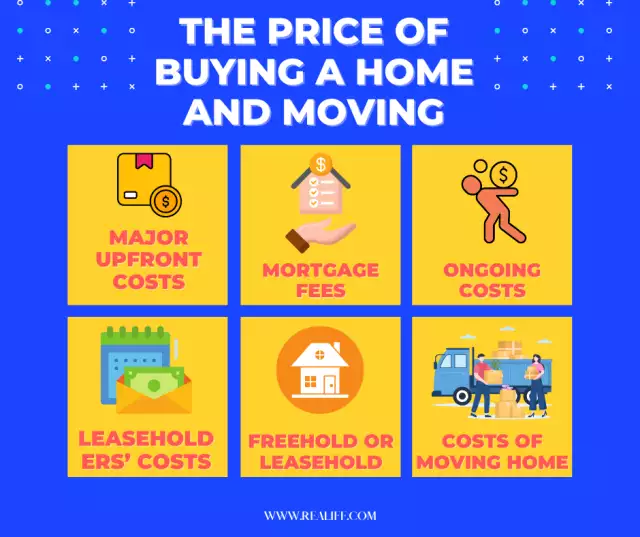The process of Buying a home for the first time
The first time buying a home can appear daunting - it may be the most expensive and emotionally laden buying of your life. Even during a pandemic, you can obtain the keys to your dream home with proper research and determination. Realiff will assist you on your way to becoming a homeowner.
Is today a good time to step into the market for buying a home?
Both yes and no. Mortgage rates hit a new low in early 2021 but rose in 2022. Meanwhile, high demand for properties drove up prices, frustrating many potential homebuyers.
On the other hand, the record-breaking housing market has now begun to cool. Realtors report slower price increases and increased inventory, while housing economists predict a drop in mortgage rates. All of this is good news for buying a home.
"Mortgage rates may have already peaked and may remain between 5% and 5.5 percent for the rest of 2022," says Mike Fratantoni , chief economist at the Mortgage Bankers Association. "If that is the case, potential purchasers who were put off by the rate hike may find their way back into the buying a home market."
The price increase has inevitably raised concerns about purchasing at the peak. Home values rise throughout time, but there is a chance that prices in some areas have reached a plateau.
Real estate is unquestionably an excellent investment, but don't buy it just because everyone else is doing it. Realiff advises you to wait for and consider another factor.
Buying a home process
Here's the buying a home step:
Recognize your motivations for buying a home
Buying a home is an extensive choice that should not be taken lightly. If you are unsure about why you want to buy a house, you may regret your decision.
To begin, follow these steps:
- Set personal and financial objectives.
- Make a list of what you value in a home? Do you long for security? Is the location of buying a home the most important factor? Are there any must-have amenities?
- Does it make financial sense for you? Would another year or two of renting enhance your financial situation?
- Are you ready to take on the burden of house maintenance?
Examine your credit score
In the buying a home process, checking your credit score will assist you in determining your financing possibilities; lenders use it (among other things) to calculate your loan pricing and determine your ability to repay your mortgage. The stronger your credit history, the greater your chances of obtaining financing at the best terms and rates.
To begin, follow these steps:
- You can obtain your credit report and score. Your bank or credit card agency may provide free access to your credit score or report.
- Consider the effects of different credit score ranges on your interest rate, monthly payments, and total interest. In general, the lower your credit score, the higher the cost of your mortgage.
- AnnualCreditReport.com allows you to obtain free credit reports from each of the credit agencies once every 12 months. If you find any inconsistencies, contact each agency and report the error.
- Find out how to acquire your free credit report and score from Realiff in various methods.
Make a housing budget
A realistic budget for your new house will help you determine what you can afford and how high your total spending on buying a home will be.
To begin, follow these steps:
- The purchasing price is not the only consideration. Consider your other expenses carefully to determine what you can afford.
- Determine the maximum loan amount you are qualified for.
- Determine how much you can save for a down payment and a reserve fund for ongoing or unforeseen maintenance needs.
- Check to see if your monthly budget can accommodate the mortgage payment as well as other costs such as childcare, tuition, utilities, groceries, and so on.
Put money aside for a down payment
To avoid paying private mortgage insurance, or PMI, you must save at least 20% of the home's buying price as a down payment. Some lenders offer no-PMI mortgages with lesser down payments but expect to pay a higher interest rate.
To begin, follow these steps:
- Investigate the down payment criteria for the loan you're interested in so you know exactly how much you'll need. If a friend, relative, or employer has offered to make a down payment gift, begin a conversation right away to find out how much they intend to contribute.
- If you don't have much saved for a down payment, look into federally backed solutions. FHA loans, which the Federal Housing Administration insures, demand only 3.5 percent down. Still, VA and USDA loans require no down payment.
- Conventional loans guaranteed by Fannie Mae and Freddie Mac need only a 3% down payment.
- Investigate a local or state first-time homebuyer assistance program for aid with closing fees or a down payment.
Look into mortgages
Preapproval for a mortgage is useful when making an offer on a home since it provides you with a better idea of how much you can pay.
To begin, follow these steps:
- To maximize your chances of acquiring a cheap interest rate, shop with at least three lenders or a mortgage broker.
- Work with a seasoned mortgage lender who can walk you through your alternatives and associated fees.
- Inquire about any first-time homebuyer programs or other incentives that may be available to you.
Hire the services of a real estate agent
A professional real estate agent can help you identify your dream house and negotiate with the seller on your behalf, saving you time and money.
To begin, follow these steps:
- Before selecting a real estate agent, contact several and request a meeting to discuss your requirements. "Someone who knows the area can also advise you if your budget is reasonable or not, based on the characteristics you want in a home," Kruger says. "They can also guide you to neighboring locations in your selected neighborhood or other types of factors to assist you in finding a home.
- Find out about a real estate agent's track record, understanding of your desired neighborhood, and workload before hiring them. You don't want someone who is constantly on the go.
- Although agents can connect you to specialists such as house inspectors, contractors, appraisers, and title agencies, you should still shop about and compare rates.
View a variety of houses
Viewing listing images isn't a replacement for visiting homes in person — with appropriate safeguards in the event of a pandemic — and getting to know the community and its features.
To begin, follow these steps:
- Let your real estate agent know what kinds of homes you wish to see, or look for them yourself online. Your realtor can set up an automatic search for properties that suit your criteria in the local multiple listing service (MLS), a database of homes for sale. You might be unable to tick off every item on your home amenity wish list, so prioritize what's most important to you aside from location.
- Drive through neighborhoods you like to see what's for sale, and then attend open houses for properties that interest you. Keep detailed notes on each property you visit. It's easy to forget which homes you loved after a few showings.
- Maintain an open schedule so you can pounce when a fantastic home is listed, especially in a seller's market. You may gain an advantage over other purchasers if you see it and make a bid as soon as possible.
Make an offer
Understanding how to make an acceptable offer on a home will help raise the likelihood that the seller will accept it, bringing you one step closer to receiving those desired house keys.
To begin, follow these steps:
- When you locate "the one," your real estate agent will assist you in preparing a complete offer package, which includes your offer price, preapproval letter, and evidence of finances for a down payment (which is helpful in competitive markets), and terms or contingencies.
- Counteroffers on your price, terms, or contingencies are possible. You can respond to the counteroffer or reject it and move on.
- When your offer is accepted, you will sign a purchase agreement that includes the home's price and expected closing date. You must pay an earnest money deposit, typically 1% to 2% of the purchase price. If you back out, the seller may be entitled to keep the money.
- Contingency clauses protect the buyer and commonly include an appraisal, financing, and a house inspection. If a house inspection report reveals severe flaws, you can frequently back out of the contract and receive a refund.
Request a home inspection
A home inspection provides an overall view of the mechanical and structural issues with the property. The house inspection will assist you in deciding how to continue with the closing. If you have a contract contingency, you may need to ask the seller for repairs or elect to back out of the purchase.
To begin, follow these steps:
- Your real estate agent can make suggestions for house inspectors, but conduct your research before hiring one. Depending on your contract and state of residency, you should have a home inspection completed 10 to 14 days after signing a purchase agreement. As a buyer, you're usually responsible for paying the home inspector. While the rates might vary, HomeAdvisor by Angi estimates that you'll pay an average of $270 to $400.
- To ensure the home inspector has sufficient experience, study internet reviews, request former client references, and examine their credentials.
- Examine the house inspection checklist to see what is and is not covered.
Repairs and credits should be negotiated
Your home inspection report may disclose significant or minor flaws. Major difficulties will almost certainly need to be resolved before your mortgage lender finalizes your loan. However, minor concerns can sometimes wait until you take home ownership.
To begin, follow these steps:
- Enlist your agent's assistance in negotiating with the seller. Request that the seller performs the repairs or provide you with a credit at closing.
- Your lender may refuse to approve your loan if there are risks such as structural damage or faulty electrical wiring. Similarly, you may not have the funds or willingness to handle such repairs after buying a home.
- Some sellers would not agree to extensive repairs, which is why a home inspection contingency is a good option – to provide you a way out of the contract if the house isn't in perfect condition.
Ensure your funding
To get final loan approval, you must keep your finances and credit in order during the underwriting process. You won't want to open new credit lines or make any large purchases until the paperwork is signed when you're ready to close.
To begin, follow these steps:
- Respond quickly to requests for more evidence, and double-check your loan estimate to ensure all details are precise so there are no surprises later. As your lender completes the underwriting process, you may be required to provide more paperwork, such as:
Bank statements
Returns on Taxes
Additional income documentation
A gift letter or written documents explaining significant payments into your bank account
- Pre Approval does not guarantee approval until a lender issues the final approval. Keep your money and credit in good shape from pre-approval until closing day. If possible, avoid changing jobs before closing on your new house.
- Also, avoid using credit cards excessively, taking out new loans, or canceling credit accounts. These actions can harm your credit score or affect your debt-to-income ratio, risking your loan approval.
Conduct a last walk-through
The last walk-through allows you to inspect the property before it becomes yours. This is your final opportunity to inspect the house, ask questions, and address any outstanding issues before it becomes your responsibility.
To begin, follow these steps:
- Bring your home inspection checklist and other documents, such as repair invoices and receipts for any work done by the owner, to ensure that everything was done as agreed and that the home is in move-in condition.
- Request that your real estate agent attend so they may act as witnesses and answer any questions you may have.
- If any repairs or issues remain unresolved, have your agent immediately engage with the seller and your lender. Your closing date may need to be pushed out to guarantee that those concerns are addressed first.
Close to your house
When all contingencies have been met, you are satisfied with the final walk-through, and the closing agent has given the all-clear, it is time to make it official and close on your home. In this final phase, your lender will give you the "clear to close" status on your loan.
To begin, follow these steps:
- The lender will send you a closing disclosure three business days before your closing date, outlining all of the specifics of your loan, such as the monthly payment, loan type and term, interest rate, annual percentage rate (APR), loan costs, and how much money you must bring to closing. You (the buyer) will be present at the closing, along with your real estate agent, the seller's agent, the seller (in some situations), and the closing agent, who may be an escrow or title company representative or a real estate attorney. Depending on the escrow company's regulations, this is also the time to wire your closing charges and down payment.
- Before closing, carefully check the closing disclosure and compare it to the loan estimate to ensure the closing fees and loan terms are consistent. Before you sign the closing documents, ask questions regarding your loan and fix any mistakes (such as your name or personal information).
- On closing day, thoroughly check any paperwork you sign and ask for an explanation on anything you don't understand.
- Before departing, double-check that you have all house keys, access codes, and garage door openers.
- You'll walk away from closing with a copy of the paperwork (or a digital file) and your new house keys. Keep your documentation in a safe place for future reference.
Once the paperwork is signed, the house is officially yours, and you'll be given the keys. Congratulations! The exciting phase now begins: moving in and making the house your home.
House haunting by Realiff
Buying a home in 2022 is one of the most significant expenditures you will ever make. selling and buying home with Realiff is the greatest – and the slightest stressful – way to go.
Realiff's experts will assist you in reviewing your financial condition before searching for buying a home or commercial real estate. This will tell you how much of a down payment you can make and how much of a monthly mortgage payment you can afford. Lenders will consider the ratio of your earnings to your debts. Most will ask that your monthly housing costs be under 28% of your total monthly income and that your total debt stays under 36% of your total monthly income.
However, you should consider what fits your budget rather than what the lender thinks you can afford. If you are now paying $1200 a month in rent and barely scraping by, how can you expect a mortgage of that size with the added insurance and upkeep costs of house ownership? You must do what is best for your budget and finances. Remember that you can always progress to a larger home over time. Relief at real estate can be found on Realiff.com




